Chamber Ballet Taipei’s (台北室內芭蕾舞團) founder and artistic director Allen Yu (余能盛) has returned to his favorite muse for this year’s annual production, Peter Tchaikovsky.
The Austria-based Taiwanese choreographer has frequently said that he loves the 19th-century Russian composer’s music for its combination of romance and sadness, and because it provides him “with limitless imagination.”
That imagination has been put to use in Romance — The Music and The Destiny of Tchaikovsky (羅曼史~柴可夫斯基的音樂與人生), which will be performed in Taipei’s Metropolitan Hall this weekend and in Tainan the following weekend.
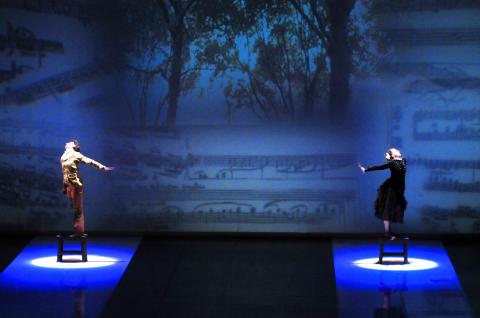
Photo courtesy of Chamber Ballet Taipei
To give the full experience of the two Tchaikovsky pieces used in the production, the company will be performing in Taipei with the Taipei Symphony Orchestra (台北市立交響樂團) under the baton of Dutch guest conductor Antony Hermus — who has worked with the company twice before — and with the Taiwan Soloists Symphony Orchestra (台灣獨奏家交響樂團) in Tainan under the baton of Hsiao Pang-hsing (蕭邦享).
The 25-member cast includes two foreign guest artists, both soloists with the Romanian National Ballet.
Although Yu has used Tchaikovsky’s life as the basis of previous productions, such as Tchaikovsky — None But the Lonely Heart and When Ballet Meets Tchaikovsky, in a telephone interview on Monday he said this time he wants to use the music to show the composer’s background, and why he wrote the music that he did.
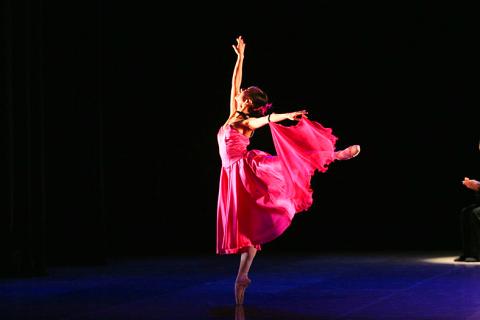
Photo courtesy of Chamber Ballet Taipei
Yu has read several biographies of the great composer as well as the correspondence between Tchaikovsky and his patron, Nadezhda von Meck, who supported him for 13 years, though on the condition that they never meet.
“His love was a real story. I can’t believe that such a relationship [with von Meck] could exist … Most of his music was for her, in his letters he talked about ‘my pleasure to write this music for you,’” Yu said.
Romance is divided into two parts. The first uses Serenade for Strings in C, Op.48, which has long been a favorite of choreographers such as George Balachine, and the second half is danced to Violin Concerto in D Major,Op.35.
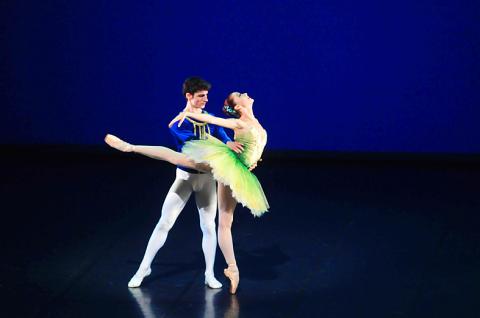
Photo courtesy of Chamber Ballet Taipei
For the serenade section, Yu returns to a metaphor that he has used before on stage — the birdcage, with dancers trapped inside unable to get out.
“There are two couples, one physical and one spiritual,” he said.
For the Violin Concerto Yu changes the perspective to that of the composer himself, given how personal the piece was for Tchaikovsky and what an effect it had on him.
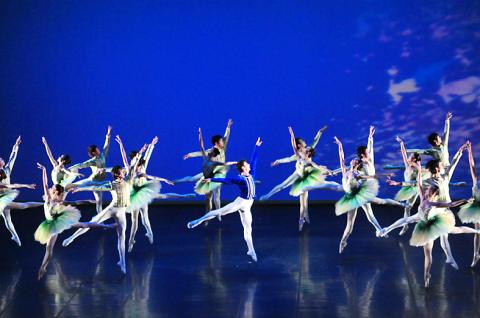
Photo courtesy of Chamber Ballet Taipei
“He only wrote one, no one [violinist] wanted to play it, and there was a lot of criticism when it finally was played. He never wrote another,” Yu said, adding that it was now considered one of the four greatest concertos for the violin ever written.
The violin solo will be performed in Taipei by a young man, Tseng Yu-chien (曾宇謙), who began studying the violin at age three and has won several international competitions. For the Tainan performances, the soloist will be Tsai Cheng-han (蔡承翰).
Yu’s enthusiasm and passion for Tchaikovsky is palpable, even in his program notes for the show.
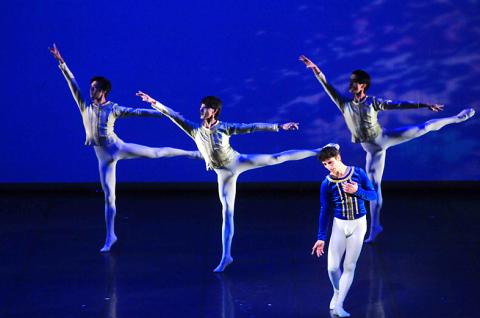
Photo courtesy of Chamber Ballet Taipei
“By writing the Serenade and Violin Concerto, his music brought people boundless dreams, making choreographers want to use the human body to express that kind of special feeling on the dance stage,” Yu wrote.
While the six-year-old Chamber Ballet only comes together each summer for one production — it is all the time Yu can take away from his main job as deputy ballet director and choreographer at the Opera House in Graz — the shows have been getting stronger each year and Romance holds great promise for another terrific production.

The 1990s were a turbulent time for the Chinese Nationalist Party’s (KMT) patronage factions. For a look at how they formed, check out the March 2 “Deep Dives.” In the boom years of the 1980s and 1990s the factions amassed fortunes from corruption, access to the levers of local government and prime access to property. They also moved into industries like construction and the gravel business, devastating river ecosystems while the governments they controlled looked the other way. By this period, the factions had largely carved out geographical feifdoms in the local jurisdictions the national KMT restrained them to. For example,

April 14 to April 20 In March 1947, Sising Katadrepan urged the government to drop the “high mountain people” (高山族) designation for Indigenous Taiwanese and refer to them as “Taiwan people” (台灣族). He considered the term derogatory, arguing that it made them sound like animals. The Taiwan Provincial Government agreed to stop using the term, stating that Indigenous Taiwanese suffered all sorts of discrimination and oppression under the Japanese and were forced to live in the mountains as outsiders to society. Now, under the new regime, they would be seen as equals, thus they should be henceforth

With over 100 works on display, this is Louise Bourgeois’ first solo show in Taiwan. Visitors are invited to traverse her world of love and hate, vengeance and acceptance, trauma and reconciliation. Dominating the entrance, the nine-foot-tall Crouching Spider (2003) greets visitors. The creature looms behind the glass facade, symbolic protector and gatekeeper to the intimate journey ahead. Bourgeois, best known for her giant spider sculptures, is one of the most influential artist of the twentieth century. Blending vulnerability and defiance through themes of sexuality, trauma and identity, her work reshaped the landscape of contemporary art with fearless honesty. “People are influenced by

The remains of this Japanese-era trail designed to protect the camphor industry make for a scenic day-hike, a fascinating overnight hike or a challenging multi-day adventure Maolin District (茂林) in Kaohsiung is well known for beautiful roadside scenery, waterfalls, the annual butterfly migration and indigenous culture. A lesser known but worthwhile destination here lies along the very top of the valley: the Liugui Security Path (六龜警備道). This relic of the Japanese era once isolated the Maolin valley from the outside world but now serves to draw tourists in. The path originally ran for about 50km, but not all of this trail is still easily walkable. The nicest section for a simple day hike is the heavily trafficked southern section above Maolin and Wanshan (萬山) villages. Remains of